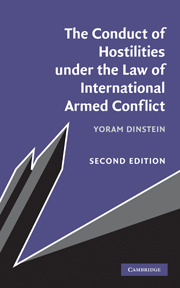Book contents
- Frontmatter
- Contents
- Introduction to the Second Edition
- Preface
- Table of cases
- Table of treaties
- List of abbreviations
- 1 The general framework
- 2 Lawful combatancy
- 3 Prohibited weapons
- 4 Lawful targets of attack
- 5 Protection from attack of civilians and civilian objects
- 6 Measures of special protection from attack
- 7 Protection of the environment
- 8 Specific methods of warfare
- 9 War crimes, orders, command responsibility and defences
- General conclusions
- Index of persons
- Index of subjects
General conclusions
- Frontmatter
- Contents
- Introduction to the Second Edition
- Preface
- Table of cases
- Table of treaties
- List of abbreviations
- 1 The general framework
- 2 Lawful combatancy
- 3 Prohibited weapons
- 4 Lawful targets of attack
- 5 Protection from attack of civilians and civilian objects
- 6 Measures of special protection from attack
- 7 Protection of the environment
- 8 Specific methods of warfare
- 9 War crimes, orders, command responsibility and defences
- General conclusions
- Index of persons
- Index of subjects
Summary
740. Law must not be confused with liturgy. It is not enough to enact and reiterate the law: to be meaningful, norms must be adhered to in reality. The nature of LOIAC is such that Belligerent Parties tend constantly to trade reciprocal accusations of breaches and worse. Absent effective modalities of supervision and dispute settlement, there is no way to guarantee that LOIAC is actually implemented. No enforcement mechanisms established thus far have been crowned with outstanding success. There is a growing acknowledgement of the need to prosecute and punish war criminals for serious breaches of LOIAC, but the long-term success of the ICC is still a matter of conjecture. The issue of securing a more efficacious implementation of LOIAC is not likely to fade away in the foreseeable future.
741. It is nevertheless a gross mistake to believe (as some observers do) that better implementation is the sole major item on the present agenda of LOIAC. A legal system requires clarity, on the one hand, and adaptability to changing circumstances, on the other. In theory, the broad brush strokes of LOIAC are beyond dispute. The two cardinal principles of distinction and unnecessary suffering, plus the principle of proportionality in attack, are elevated to the pinnacle of the law regulating the conduct of hostilities in international armed conflict. However, as one descends from abstractions to practicalities, consensus shrinks.
742. The ‘Great Schism’, separating Contracting Parties of Additional Protocol I from some key players in the international arena led by the US, has catapulted many unsettled questions to the fore.
- Type
- Chapter
- Information
- Publisher: Cambridge University PressPrint publication year: 2010



